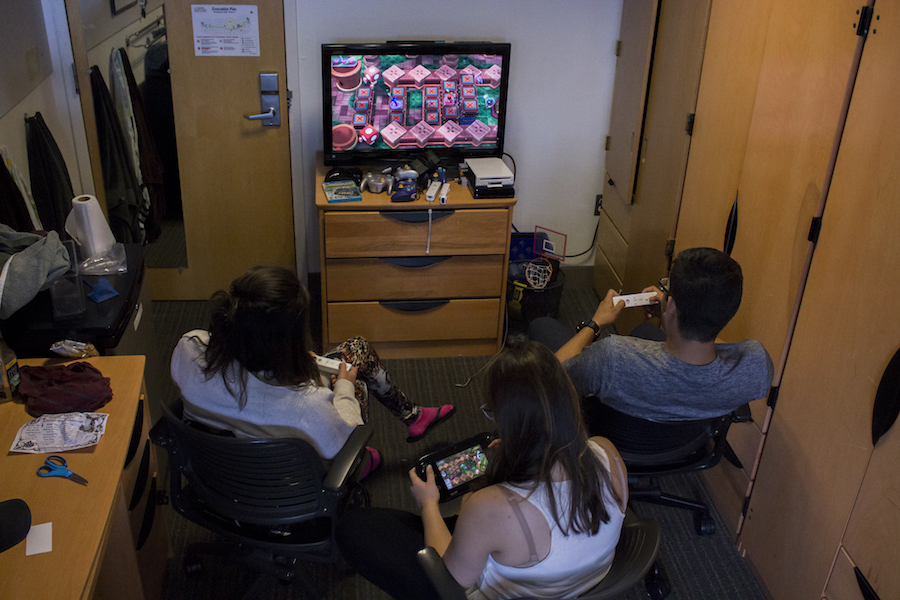
UC Davis ModLab’s GameCamp! teaches students, faculty, staff game design
The UC Davis ModLab, an experimental laboratory used for media research, offers students, faculty and staff the opportunity to learn about game design. Created in 2015, GameCamp! is a series of free workshops throughout the year that teach introductory game design concepts.
“We want anyone who’s interested in game design at UC Davis to get these introductory concepts under their belt,” said Amanda Phillips, Interactive and Multi-Modal Experience Research Syndicate (IMMERSe) postdoctoral fellow and GameCamp! co-creator. “We cover everything from paper prototyping all the way up through tech-training. Any of these different software products that basically allow people to create video games without knowing how to program.”
According to Phillips, game design is limited to people who have access to technology, training in design and longstanding familiarity with gaming. GameCamp! was created to open up the world of game design to non-computer science majors and those who do not have experience with programming. The program also makes a special effort to attract demographics of people who do not traditionally participate in game design, such as women and people of color.
“What we’re trying to do is show that anyone can design games if they want to,” Phillips said. “That’s sort of the spirit behind [GameCamp!]. It’s opening up game design to a lot of different folks. The game industry by contrast is something like 80 percent straight, white men. It’s really cool that GameCamp! has been able to bring in the pool of people who are interested in designing games.”
In addition to workshops, GameCamp! also offers Game Jam, an event in which students compete against each other in teams of three to create their own unique game.
“Game Jam is an event that’s designed to get people to create games really quickly,” Phillips said. “It sort of short-circuits the perfectionism and this sort of creative loop that you get yourself into when you’re trying to create something new. The idea of a game jam is that you just do it. You’re going to create something in this constrained period of time.”
Whereas typical game jams last anywhere from a day to a weekend, the UC Davis event takes place over the course of an entire month. This year, UC Davis’ Game Jam kicked off on April 29 and ended on May 31.
“The reason we do this is because we’re working with people who are very intro-level in game design,” Phillips said. “So we want to give them time to learn the tools and figure out different problems that they may run into in the design process. Also, because a lot of the people that participate in Game Jam are students, we want to make sure we respect their time and acknowledge that they have coursework to do and exams coming up, that sort of thing.”
This is one reason why second-year computer science major Bayan Mashat decided to participate in this year’s Game Jam. Prior to attending GameCamp!, Mashat already had some self-taught knowledge of video game design. In her junior year of high school, she created an educational video game to teach kids web searching skills, including how to use Google’s search engine. For Mashat, the most difficult part of the game development process is the planning.
“You have to have a plan, an idea, a storyboard,” Mashat said. “You have to think thoroughly about the levels, the controls. Once you have all this done, you just have to execute it, which is easier.”
Although Mashat sometimes has problems coming up with ideas from scratch, she is able to build upon and work on other people’s ideas, which is why she attended Game Jam.
Game Jam is both a showcase and competition. Every team that participates in Game Jam gets a “swag bag” filled with items such as GameCamp! T-shirts, pens, tote bags and even bigger prizes depending on which category the team wins.
The first category is “Judge’s Choice Game,” in which the judges choose a game with a seamless integration of gameplay, narrative and aesthetics. The second category is “Interpretation,” in which the game that interpreted the competition’s overall theme most creatively wins. The last category is “Innovation.” Judges select a game with innovative narratives, art design or game mechanics.
“We thought these categories were competitive, but also [left] enough space for people who have never designed a game before,” Phillips said. “They could potentially win the Innovation category, for example. We’re not looking for [something] polished, we’re looking for something interesting that people have created.”
ModLab also works in collaboration with the Game Dev and Arts Club at UC Davis. The Game Dev and Arts Club has offered students a place to hone their game development abilities with workshops, game jams and professional opportunities since 2014. ModLab provides the Game Dev and Arts Club with the necessary materials to run workshops and provides members with possibilities internships.
“ModLab has a lot of graduate [students] and professors who do projects and they often look for undergraduates to work on their projects,” said Michael Lee, fifth-year communication major and Game Dev and Arts Club president. “Last summer, eight of us joined one of their projects and some of us were paid with money and some were paid by credit.”
One thing Lee enjoys most about GameCamp! is learning how to work as a team.
“There’s a lot of communication and technical things where you have to communicate,” Lee said. “It’s probably the biggest thing I learned [from GameCamp!].”
Aside from technical and communication skills, what Phillips enjoys most about GameCamp! is working with students.
“[For me,] to see students discover that they can actually come up with really cool game ideas when they may not have thought of before they had the skills to do it [has] been the most rewarding part,” Phillips said.
Written by: Jacqueline Chu — features@theaggie.org








